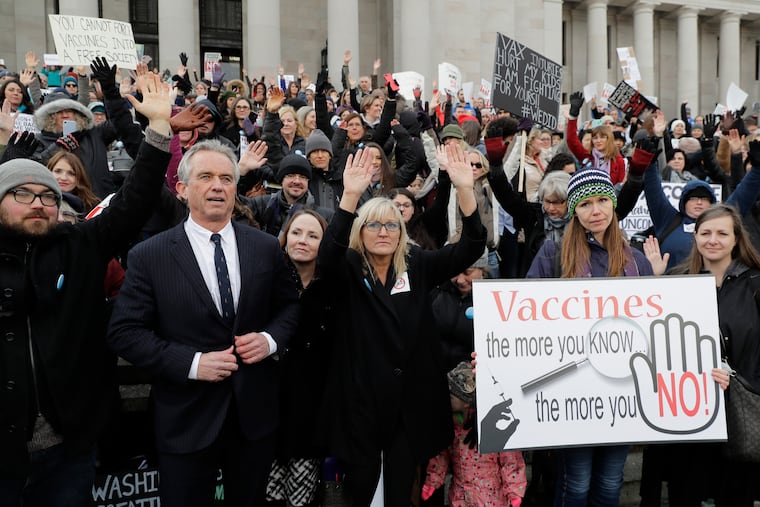In Philadelphia’s measles outbreak, a reminder of the importance of vaccines | Editorial
The actions of anti-vaxxers threaten to erase decades of public health gains and reintroduce long-dormant diseases to vulnerable populations.

From so-called vaccine skeptics like Florida Gov. Ron DeSantis to anti-vaccine advocates like Robert F. Kennedy Jr., some politicians are hoping to gain political power by exploiting the misguided fears of worried parents and the curdled selfishness of American individualism exemplified by the anti-vaxxer movement.
Although these candidates’ chances of reaching the presidency are slim, the potentially lethal consequences of their way of thinking threaten to erase decades of public health gains and reintroduce long-dormant diseases into populations that are too young to be vaccinated.
Philadelphians were reminded of the dangers of the anti-vaccine movement last week when the city’s Department of Public Health confirmed a measles outbreak. As of Friday, there were six confirmed and three suspected cases, officials said. The cluster began at Children’s Hospital of Philadelphia and spread to a day-care center where parents had sent their ill child in violation of quarantine guidelines.
Measles is a childhood disease caused by a virus that produces a characteristic red rash. It spreads easily (it is significantly more contagious than COVID-19) and can be fatal. Symptoms include high fever, cough, and runny nose. Serious cases can cause brain inflammation or respiratory failure. Thanks to the MMR vaccine — which provides protection against measles, mumps, and rubella — the disease has been nearly eradicated in the United States.
As of Dec. 7, a total of 41 measles cases were reported across the country, according to the Centers for Disease Control and Prevention. The largest number of cases in the last 30 years occurred in 2019, when more than 1,200 were confirmed in 31 states. Most cases were among people who were not vaccinated against measles.
Infants typically receive the first dose of the MMR vaccine between 12 and 15 months, and children receive their second dose between the ages of 4 and 6.
Along with unprotected children, the illness can be especially dangerous for those who are pregnant and people with weakened immune systems.
The latest Philly cluster began with an infant — who may have been too young to be vaccinated — who was admitted to CHOP in December, after visiting a country where measles is more common. That infant infected two others: another infant too young to have gotten the MMR vaccine, and an older child whose parents had refused vaccination. One of the older child’s parents then developed measles, as well. Another two people developed measles after one of the patients visited their day-care center, in violation of quarantine rules; it’s unclear if these two people were old enough to be vaccinated, and if so, if they had received the shot.
This cluster is an important reminder of why every eligible Philadelphian needs to receive the MMR vaccine: to protect those who are too young to get it.
Anti-vaxx parents’ fears over vaccinations often stem from a 1998 paper in the Lancet, a British medical journal, that claimed to identify a link between the MMR vaccine and autism. This study — based on only 12 children — was later retracted when it was found to be fraudulent. The British Medical Council ultimately ruled that the study’s author behaved unethically and with “callous disregard” for children.
Many studies since then have shown there is no link between the MMR vaccine and the risk of autism.
Beyond the clinical trials that are necessary for each vaccine to receive approval by the Food and Drug Administration, the MMR vaccine has been a part of childhood medical care for decades (the measles vaccine was introduced in 1963). In that period, mountains of evidence have showcased the vaccine’s effectiveness and safety.
It’s easy to forget that, in the pre-vaccination era, children often died before reaching kindergarten, let alone adulthood. In 1900, 30% of all U.S. deaths occurred in children under the age of 5. Before the polio vaccine was introduced in the mid-20th century, the virus killed or paralyzed more than half a million people around the world every year. Today, thanks to vaccination, polio is not something most Americans think about anymore.
Vaccines have put an end to what has, for generations, been a cruel part of the human experience. We must remain vigilant to avoid reverting to that deadly status quo.